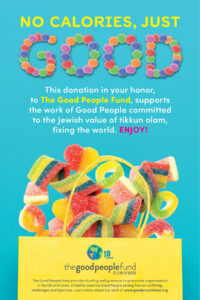At 19, I Was Forced To Marry A Stranger And Was Sexually Assaulted Every Month For 12 Years
January 9, 2024 – Fraidy Reiss, HuffPost Personal
"I love my daughters, but I did not consent to having them."
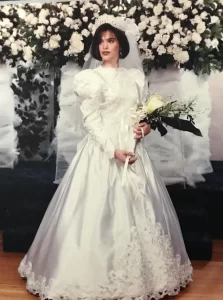
Note: The following essay contains descriptions of sexual assault and abuse.
They sent me off to be raped, with a party and a tube of K-Y Jelly.
The lubricant was to reduce the intense physical pain they explained I would endure while being penetrated by a stranger-turned-husband, without foreplay, without consent. Every month. Until death do us part.
The party — a low-budget wedding in 1995 at a Brooklyn venue aptly nicknamed Armpit Terrace — was to distract me from the horrific reality of my forced marriage to the stranger.
“Mazel tov!” they told me, beaming.
In the reclusive Orthodox Jewish community in New York City where I grew up, choices about whether, when and whom I would marry did not belong to me. At home and at the all-girls religious school I attended, where I learned to cook and sew and keep house, I was groomed from early childhood to expect a teen marriage to a stranger my family and a matchmaker would choose for me.
I was allowed to meet the stranger several times before my engagement, but I was not allowed to be alone with him nor to have any physical contact with him. I was a clueless 19-year-old who had never been allowed to “talk to a boy,” and suddenly I was given a matter of hours, over a period of a few weeks, to answer my family and his family and the matchmaker and everyone in the community standing there, tapping their feet, looking at their watches, waiting for me to tell them: You’ll marry this man we chose for you, right?
“No” was never really an option.
During my six-week engagement, I still was not allowed to be alone with the groom nor to have any physical contact with him, which left more time for me to begin experiencing the myriad other abuses that come with a forced marriage.
First, a virginity exam. The groom’s rabbi sent me to an Orthodox Jewish gynecologist, where I was instructed to disrobe, get on the examination table and put my feet in the stirrups. The doctor inserted her gloved fingers into my vagina and confirmed that my hymen was intact.
“Mazel tov!” she told me, beaming.
I attended one-on-one bridal classes, where the curriculum centered on the requirement that I have unprotected sex with my husband on my wedding night and on a monthly basis thereafter. A lifetime of rape.
Yes, the rapes probably would hurt, the bridal class teacher explained. Hence the K-Y Jelly.
“Mazel tov!” she told me, beaming.
My stranger-turned-husband turned out to be violent and abusive. I learned this exactly one week after our wedding, when he became enraged because he had woken up late, and he punched his fist through the wall — hard enough to leave a sizable hole.
His first threat to kill me came only days later. Soon these threats became more frequent, specific and gruesome. He was brimming with creative ideas for how he would end my life, and he took the time to describe them to me in vivid detail. A lifetime of fear.
Yet I was trapped.
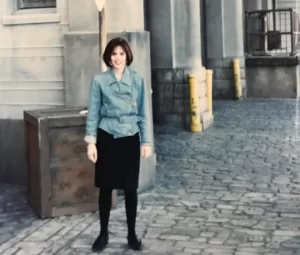
My forced marital sex was carefully timed each month for when I was ovulating. The reason for this was obvious: My first child was born 11 months after my wedding, and soon I had a second child.
I love my daughters, but I did not consent to having them. A lifetime of forced parenthood.
This denial of sexual and reproductive rights was not the only shackle preventing me from leaving my marriage. My husband did not allow me to have my own bank account or credit card, and I was taught that, under Orthodox Jewish law, if my husband allowed me to work, any money I earned belonged to him. A lifetime of domestic servitude and financial dependence.
I had limited legal rights too. Under Orthodox Jewish law, only a man can grant a divorce. I, as a woman, did not have the legal right to end my own marriage. A lifetime of being locked in unwanted wedlock.
One escape route for me would have been to move back in with my family as an agunah, a “chained woman” who is bound to a husband who refuses her a divorce. The life of an agunah is brutal; she is shamed for her powerlessness, blamed for her failed marriage and treated as an outcast.
But even this dreadful escape route was closed to me, because my family refused to take me back in. A lifetime of betrayal.
So I remained trapped in my abusive forced marriage. In accordance with Orthodox Jewish law, I was considered “unclean” every time I menstruated. While I was “unclean,” I was prohibited from having physical contact with my husband, sleeping in the same bed as him, handing him anything or undressing or singing in front of him. A lifetime of shame.
Once my period ended, I needed to count seven “clean” days without any menstrual blood, during which time the rules against physical contact continued. To make sure I stayed “clean” for the full seven days, I was required to wear white panties and, twice a day, to insert a white cloth into my vagina, swish it around and inspect it in sunlight to make sure it did not have blood spots. If I found questionable marks on my panties and could not tell whether they were blood, the rabbi would inspect them and give his pronouncement.
And the rabbi would keep my panties. A lifetime of extreme patriarchy.
Each month, after the seven “clean” days, I was forced to strip naked in front of an attendant who watched me immerse in a mikvah, or a ritual bath of rainwater, which frequently left me with a yeast infection and always left me shaking uncontrollably. A lifetime of violation.
All I wanted, every time I left the mikvah, was to take a hot shower and scrub the violation off me. That was prohibited. Instead I was required to go home and have nonconsensual sex with the man who had spent the day describing to me in graphic detail how he was going to murder me. The man who would not let me close the door when I used the bathroom, because “what was I hiding from him in there?”
No matter. I had to get on the bed and spread my legs and forget what had happened to me at the mikvah and ignore the pain while I waited for him to finish, and I had to remind myself how lucky I was that he usually was done after only three or four thrusts. A lifetime straight out of Margaret Atwood’s “The Handmaid’s Tale.”
Forced marriage — in which one or both parties do not give full, free consent — is recognized globally as a form of modern slavery. My story is far from unique: Around the world, 22 million people were in a forced marriage as of 2021.
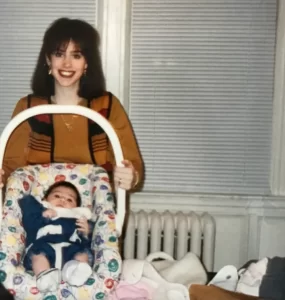
Yet, even though the United States acknowledges that forced marriage is a human rights abuse, few laws and policies are in place to prevent or punish it, and the nation has paid such scant attention to this issue that we do not even know how often forced marriage happens here.
What’s more, child marriage remains legal in most U.S. states, even though it is recognized as a form of forced marriage and a human rights abuse. Some 300,000 children were married in the U.S. between 2000 and 2018, mostly girls wed to adult men. At least 60,000 marriages occurred at an age or with a spousal age difference that should have been considered a sex crime.
My husband would regularly search through my personal belongings in front of me, including in the pockets of the clothing in my closet and in my bag of tampons under the bathroom sink. A lifetime of subjugation. When I finally realized at age 27 that I was the only person who would help me leave my abusive forced marriage alive and I decided I would secretly save up cash for my escape, I found the only safe hiding place in the house: a box of Whole Grain Total in the pantry.
I saved more than $40,000 in that cereal box over the next five years.
During those years I also defied my community and did something no one in my family had ever done: I became a college student. My husband forbade me from attending classes. I informed him, calmly, that nothing he did to me would stop me from getting my education.
And I did something no one I knew had ever done: I threw out the limp, ugly wig I was required to wear as a married woman to cover my own thick, healthy hair. I walked outside with my uncovered head held high — the equivalent, in that community, of walking outside naked.
My family retaliated immediately by shunning me. One of my sisters notified me that my family was planning to sit shiva — or observe the Jewish mourning ritual for me — as if I had literally died. I have had almost no contact with my family since that day. A lifetime of being dead.
But I graduated from Rutgers University (as commencement speaker, the equivalent of valedictorian) at age 32, and I escaped my abusive forced marriage on my own, with my daughters and my box of Total. I fled the Orthodox Jewish community too, and I rebuilt my life.
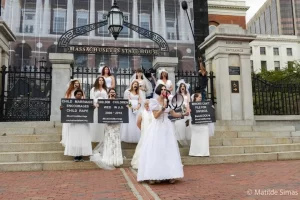
In 2011 I founded a nonprofit organization, Unchained At Last, to combat forced and child marriage in the U.S. through direct services and systems change.
The U.S. is one of 193 countries that agree forced and child marriage are harmful practices, particularly for women and girls, and have promised to eliminate these abuses by year 2030 to help achieve gender equality, under the United Nations Sustainable Development Goals. Yet the U.S. is not on track to keep its promise.
I refuse to accept this. Not after I escaped my lifetime of oppression.
We at Unchained are fighting back by providing crucial wraparound services to a long-ignored population: those who are fleeing an existing or impending forced marriage in the U.S. To date we have provided legal and social services, always for free, to nearly 1,000 individuals, to help give them a lifetime of dignity, safety and hope.
We also started a national movement to end child marriage. In the last few years, our groundbreaking research and relentless advocacy have allowed us to help change the law in 10 U.S. states to ban child marriage — a stunning victory for the 7.5 million girls who live in those 10 states — and we are working on the other 40.
A lifetime of preventing other lifetimes of rape.
“Mazel tov!” I now tell myself, beaming, with each triumphant step closer to ending forced and child marriage in the U.S.
Fraidy Reiss is a forced marriage survivor turned activist. She is the founder and executive director of Unchained At Last, a survivor-led nonprofit organization working to end forced and child marriage in the U.S. through direct services and systems change. Fraidy’s research and writing on forced and child marriage have been published extensively, making her one of the nation’s foremost experts on these abuses. She has been featured in books (including as one of the titular women in Hillary and Chelsea Clinton’s “The Book of Gutsy Women”), films and countless television, radio and print news stories.




